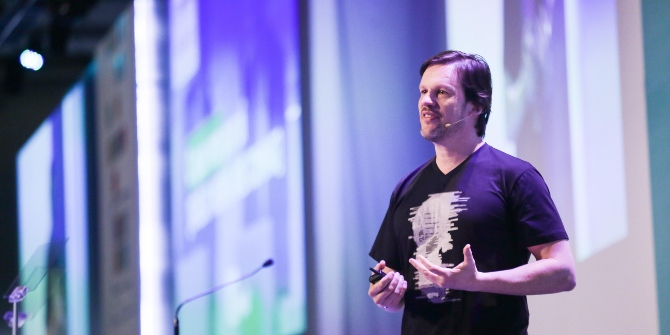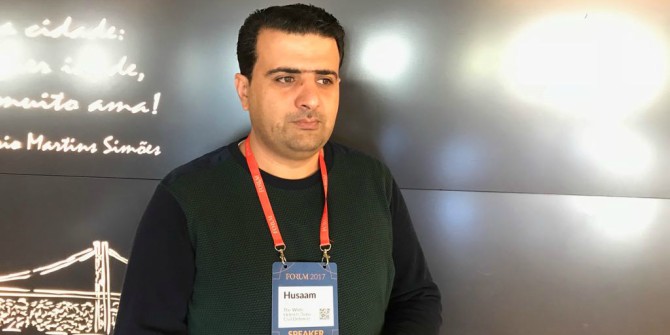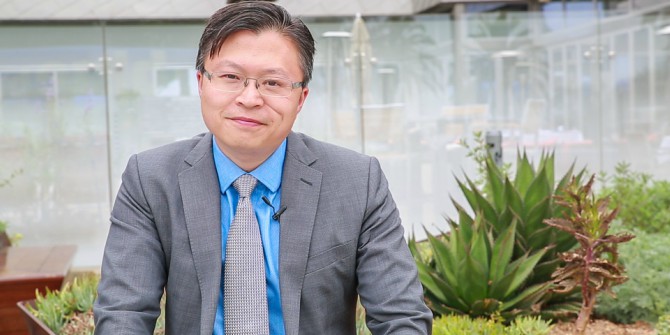
Earlier this year, San Francisco-based venture capital firm Riverwood Capital invested US$ 20 million in Omie, a Brazilian start-up that provides small and medium businesses (SMBs) with an AI-powered business management software. Omie’s genius idea was to focus on small firms, not served by larger management software services. By automating business functions, the company essentially eliminates the massive amount of paper work required in Brazil, a country notorious for red tape. “Cloud management platforms are revolutionising small and medium businesses in Brazil,” says Marcelo Lombardo, Omie’s CEO and founder. He spoke with LSE Business Review managing editor Helena Vieira on 5 November during the Web Summit conference in Lisbon.
Starting from the beginning, what does Omie do?
Omie is a cloud management software for small and midsize businesses. We put together pretty much everything a small business owner needs for his daily life (financials, invoicing, inventory, manufacturing, etc). It’s an integrated software in the cloud. And right now we are also embedding financial services in the software. We are making loans to small businesses. A couple of months ago, we released our digital bank account inside the software. It’s pretty cool because it’s not another digital bank account. The software is the bank front. There will be no bank reconciliation. Everything is automated inside the same platform. Business owners can manage their companies with fewer people than they used to.
Omie is an enterprise resource planning software, right?
Yes, and we call it a management software. Some call it cloud accounting software, but it’s not really accounting. It is more like financial control and cash flow management.
What functions does your software cover?
Accounts payable, receivables, cash flow, bank control, invoicing, inventory, manufacturing plants, shipping control, customer relationship management, point of sale, all the software infrastructure that helps a small and mid-sized business operate.
Let’s think of an example. Let’s say I sell books, I have a small bookstore. So, the moment I sell a book, that goes straight to your software, from my computer to your servers…
It depends on how your company operates. If you have a point-of-sale checkout, you will have our software running in the checkout computer, so, once you read the barcode, it will go through the inventory, which shares information with your website or marketplaces like Amazon. It doesn’t matter where the purchase order came from, the stocks are centralised so that you can have a broader view of your company and its resources.
“When big companies close their doors, it’s more likely to be through mergers and acquisitions. Small companies go bankrupt.”
And how does a bank account work inside the software? What functions does it help me with?
We have realised that there’s huge friction in companies’ money-in and money-out processes. It’s hard to receive money from clients, and it’s also not that easy to pay your bills. There’s friction there. We created this bank account mainly to make this process simpler. With banking inside the software, we will help you keep control of your accounts payable. Just to give you an idea: we work with internet, electricity, water and cable TV providers, and integrate them to generate automatically all your bills to be paid. Once you authorise us, we will get money from your bank account and transfer it to the providers. So, there will no longer be human work in those tasks. Looking from the other side, from the receivables point of view, charging your clients will be easier. You can issue what we call “boleto”, a bank voucher for your clients to pay. This process is automated and you can check right away if the client has paid it or not. It’s all integrated.
Does the banking function report directly to the central bank? Are you becoming a bank too?
That’s a very common question. ‘Marcelo, did you get a banking licence?’ Are you kidding me? No, we did not. We are using a banking-as-a-service provider that white-labels the service for us. Behind the scenes there are real banking institutions working, but we are not the bank controllers. We are not bankers. We are software developers.
But you have to work with banks, right?
I work with one particular bank and this bank gives me access to the Brazilian compensation chambers. So, that’s about how it works.
That way you’re not making big banks nervous about your incursions into their territory…
Well, I prefer to think in a different way. Big banks in Brazil say that they don’t handle small companies very well. Most small companies barely have access to the most basic banking services, and when they do, they pay huge fees. The big banks are always complaining they don’t make money with small companies. They actually lose money, even when they charge excessive fees. What we’re doing is releasing the big banks from small companies and helping them not lose money anymore.
So, you’re helping banks…
Yeah. You are losing money with a small company? No problem. I will take our clients out of your way and you will no longer lose money.
What is the the equivalent of Omie for big companies? Would it be SAP or Salesforce?
It’s more like SAP for the big companies. And by the way before founding Omie, I used to run a company like this and I was an SAP competitor. We were fighting for the big accounts and my life used to be miserable. Then we realised, okay, maybe there’s a broader audience we can help with our knowledge in business management. And then we started to create from scratch a new product for small businesses.
“American venture capitalists are targeting Latin America, and Brazil in particular… There aren’t that many opportunities in a stable market such as the US.”
I saw a video in which you talk about how you approached accountants to get sales leads. Are you changing the way accountants work?
Precisely. The main point I think people should understand is that in Brazil it’s not like in the rest of the world. There’s no do-it-yourself accounting. According to the law, in order to have a regular business, you must be connected to a certified accounting professional who is responsible for the company. This means that accountants are proxies for all Brazilian companies. Once we partner with the accountant, we get access to his portfolio, all his clients, and that’s why we take accountants as shortcuts to reach our audience. This is pretty funny because our competitors are trying to reach the small business owner using digital marketing, social media, inbound marketing and things like that. But my main point is that those companies are not aware of the problems they have. So, they are not looking for a solution. There’s no point in trying to reach them using Google AdWords or things like that, they are not searching for a solution. If the accountant helps us to alert their clients to what they really need to succeed, we can partner up with them. When his client is running our software, the accountant’s cost to service that business is reduced by up to 80 per cent. The main pain for accountants is that their clients are not organised, they are messy with their financials and with their companies’ information.
You’re actually making accountants’ lives a lot easier, and maybe they’re going to have less work now…
But an accountant now can have twice as many clients if they are using Omie, because everything that used to be paper work, hand work, is now automated and integrated. And what’s the role of the accountant now? We tell them, “you guys should become consultants”. The main difference between an accountant and a consultant is that accountants will report the past and consultants will help you build the future. The skill set to each of these roles is almost the same. You can transform your accounting firm into a value-added provider and a strategic partner, and help your clients grow, instead of just helping them be compliant with government rules.
I wonder how it works with Brazilian bureaucracy, which is huge. You need to notarise everything. Are you helping decrease the level of bureaucracy or do you need the government to decrease it?
We need the government to help decrease it. There’s nothing we can do about the complexity. To invoice anything, you have to deal with five, six, sometimes seven different taxes in the very same invoice. The rules for taxes change pretty often. There are millions of exceptions, and those exceptions are always changing. So, it’s pretty hard to be compliant with the legislation. What we try to do is to use technology and artificial intelligence to keep track of these changes and help the invoicing and tax processes to be as easy as possible. We try to encapsulate all the Brazilian complexity using AI and other technologies, but we can’t get rid of the complexity. This is the role of legislators and right now, there are simplification bills going through Congress. The situation won’t change as much as we would like, but hopefully things will be a bit simpler in the upcoming years.
Tell me more about the startup environment in Brazil. There is energy, desire and excitement about doing things, but it’s still far from Silicon Valley…
I think it’s like what Silicon Valley used to be eight or ten years ago. We’re just starting. There are great entrepreneurs, great ideas and a lot of money. American venture capitalists are targeting Latin America, and Brazil in particular, because, as I told you, it’s like Silicon Valley ten years ago. So, it’s great to be living in this moment, when things are starting to rise up. There aren’t so many opportunities in a stable market such as the US, but in Brazil everything is lacking. You need everything. So, it’s a good place to be and to invest.
“How do you scale trust in a huge country like Brazil? You need to be (physically) present all over the country.”
What is the potential for Brazilian startups like yours to reach an international market?
It depends on what the startup does. There are companies already operating outside Brazil. One example is VTex, a Brazilian e-commerce platform that is spreading worldwide. But our solution is very tied to dealing with Brazilian legislation, so, it is not easy for us to leave this track and to operate outside Brazil. It’s equally hard for outsiders to come to Brazil for the same reasons.
I read that you adopted the franchising model to grow faster in Brazil.
Our lead generating model is based on this: we partner with an accountant, and the accountant gives us access to their portfolio and recommends us to their clients. When we made this process work, we soon realised that the job to be done was not to scale software sales, but to scale trust. The accountant must trust you if he’s going to give you his client list. It’s not an easy thing. Imagine: I’m an accountant, you knock on my door and I say “okay, here’s my client list”. It doesn’t work that way. By the way, the first time an accountant handed over his client list to us. I looked at my co-founder and asked, “What’s the problem with this guy? He just gave us his complete client list!” The point is, he trusted us. Now, how do you scale trust in a huge country like Brazil? You need to be present all over the country.
Physically?
Yes, and this is a very important part of the trust-building process. So, we packaged the process of partnering with the accountant and having access to his client list. We created manuals and an internal university, and we packaged the process for a franchising model. Then we started searching for entrepreneurs who could run this idea in their cities. It was a huge success.
Your big insight is that sales are still very much a person-to-person thing, personal relationships.
Yes. Trust is a big part of the sale. If you want to have the accountant in the loop, you must be physically close to him. If you are in São Paulo, it’s not easy to talk to a guy from the state of Rio Grande do Sul, a gaucho, as we call them. What do you do? Do you call them on the phone and say, “hey, give me your client list”? It won’t work. But if a gaucho talks to a gaucho, a baiano – from the state of Bahia – talks to a baiano, it will work pretty well.
It’s like you can’t rely only on technology.
No, you can’t. You can’t because Brazil looks like one country but it is not. It’s like 50 different countries inside one, different people with different cultures and you have to adapt to this reality. using local people to spread your idea.
“The problem with Brazil is that small companies are really small. They stop growing pretty early.”
Why did you sell your previous company? Is that because you didn’t see any perspective of growing anymore?
Yes, true. I used to do the same thing as big companies, competing against Oracle, SAP, TOTVS and life was not that good. All of a sudden we realised, “okay, the race is over”. Every big company has a software solution and in order to win a client someone has to lose. It’s a zero-sum game, and the race is over. We are not first, second, third, fourth or even fifth in the grid. We lost it. What’s the next race? Brazil has 18 million companies and 90 per cent of them don’t have a software solution. When people ask, “Marcelo, who’s your big competitor now?”, I tell them the number one is the paper manufacturer. Yes, pen and paper. The second is Microsoft Excel. Most companies don’t have any software solution. It’s a green field. We started this new business inside the old one, then I sold the company to an American group and kept this spin-off with a small team of seven people (me, five engineers, and a trainee). That was six years ago, and now we are close to 700 people.
What happens once you’ve acquired most of Brazilian SMBs as clients? Would you sell Omie to a larger company?
It’s not in our plans, because small companies are an endless market. They have a natural churn rate, with an average lifespan of eight to ten years. It’s as if all small companies closed down every ten years and new ones were born. That’s what I mean by an endless marketplace. Big companies don’t close their doors as often as a small companies, and when they do, it’s more likely to be through mergers and acquisitions. But small companies go bankrupt. We see it every day. Some people in Brazil like to say that the main problem is that 25 per cent of new small businesses shut down in less than two years, and less than 50 per cent manage to survive five years. They think this is the problem, but actually that’s not true. This is part of life, part of an entrepreneur’s journey. Things go wrong. Sometimes you must keep trying, again and again and again. So, just to have an idea, if you go to the small business advocacy website from the US government, you will see that 30 per cent of businesses shut down before two years and only 48 per cent survive five years. It shows that this is not a Brazilian problem. The problem with Brazil is that small companies are really small, they don’t grow. They stop growing pretty early. And that’s the main point we’re trying to fix. We truly believe that if we can help small businesses succeed and overcome the huge efficiency gap they have, we can turn our country into a better place for everyone.
♣♣♣
- This is part of a series of four interviews during the Web Summit conference in Lisbon, 5-7 November 2019. The conversation was lightly edited for clarity and brevity.
- The post gives the views of the interviewee, not the position of LSE Business Review or of the London School of Economics and Political Science.
- Featured image credit: Courtesy of Omie. Not under a Creative Commons licence. All rights reserved.
- When you leave a comment, you’re agreeing to our Comment Policy.





